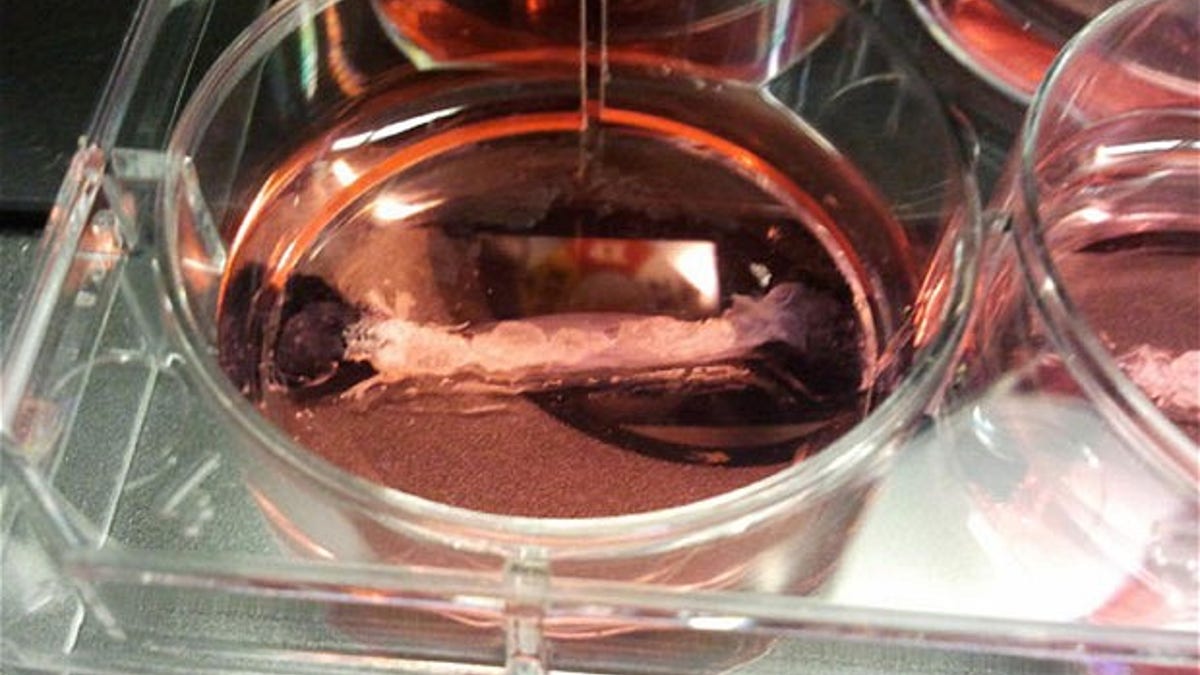
(Maastricht University)
It’s giving a whole new meaning to the term “mystery meat.”
The first ever “test tube” meat could be hitting menus in the not-so-distant future. Dutch scientist Mark Post announced at a symposium on Sunday titled “The Next Agricultural Revolution” that he has come up with a method to grow meat entirely out of cow stem cells. Post said his team aims to have a couple of thousands of small tissues to assemble into an entire hamburger as early as this fall.
The ultimate goal: Entirely replace the meat-animal industry.
The project was made possible by a donation of 250,000 euros, or close to $330,000, from an anonymous investor with a “care for the environment…and interest in life-changing technologies.”
Post, professor and head of the physiology department at the University of Maastricht in the Netherlands, spoke with FoxNews.com before the major announcement. He said that his team is very focused on making the process efficient and cost effective. However, Post said the method is still in the “laboratory phase.”
"We are just focusing on a proof of concept," Post told FoxNews.com in January . "That yes, it can be done in a laboratory, just to show the world that it can be done."
While lab-grown meat may seem incredible, it ultimately begs the question - would you eat it? Or maybe a better question would be, should you eat it?
“Right now the verdict is out,” said Dr. Fred Vagnini, medical director for Heart, Diabetes & Weight Loss Centers of New York. “But it’s a novel idea that could play into a very positive thing. This is genetically engineered food, so it could be made to be more bio-active, could be made to be less fatty. There’s a lot of control over the muscle.”
Vagnini said that this could potentially lessen the negative aspects associated with eating red meat. Many studies have shown red meat to be linked with a higher risk of cardiovascular disease, higher cholesterol, and certain types of cancer.
“The point is this could be a healthier meat,” Vagnini said. “All of the studies show that red meat is not good for you. But it does have a few benefits for many people. It has a lot of vitamin B12 and carnitine, an amino acid which is important for heart energy and cellular metabolism.”
The fat in red meat is what is typically linked to higher risks for most cardiovascular issues. But fat is what gives red meat its delicious flavor. So Vagnini said the real mystery would be how this meat would taste.
“Test tube” meat could provide potential health benefits, but with any new dietary procedure, they always run the risk of negative outcomes.
“A downside could be that because it’s genetically engineered, there could be changes in the protein DNA that could make it carcinogenic,” Vagnini said. “That’s a that main negative component when it comes to GMOs, or genetically modified organisms.”
But GMOs may be the world’s last resort when it comes to animal foods. The global demand for meat is expected to rise by 60 percent by 2050, said American scientist Nicholas Genovese, who organized the symposium at which Post spoke. But with most of the pastured lands already in use, livestock producers would have to further expand into nature.’
According to Genovese, this would cause the destruction of biodiversity, an increase in greenhouse gases and an increase in many diseases.
And for those reluctant to turn to vegetable substitutes, Vagnini said that it’s methods like these that will help meet the growing demand for meat while helping to save the planet.
“Sooner or later we can’t continue to feed the world,” Vagnini said. “Eventually we’ll have to go to these alternative foods, and I personally think they can be made more safely.”
FoxNews.com’s Joshua Rhett Miller contributed to this article.
